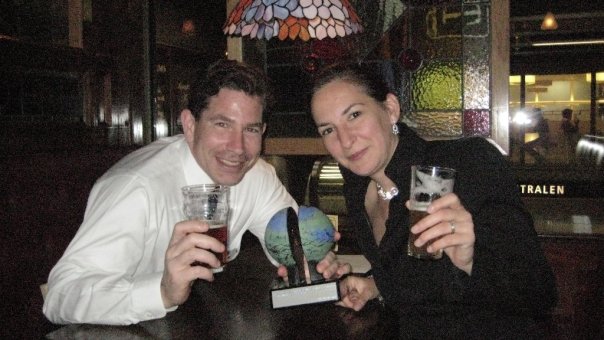When they met in 2003, the two founders of Magpi were members of the slow-paced field of international development. But soon enough, Joel Selanikio, a Center for Disease Control and Prevention outbreak investigator and Rose Donna, a consultant for the American Red Cross, began developing an app that would transform health data collection and make their positions semi-obsolete.
Magpi has come a long way since then. Initially known as the EpiSurveyor, the program was adapted from Pendragon, a 1990s software for these pre-cell phone era relics: Personal Digital Assistants.
Their first foray into entrepreneurship was a bar, the Wonderland Ballroom.
But in the mid-2000s, cell phones began popping up in rural areas throughout Africa and Southeast Asia, opening up the field for local users to upload their data to a secure cloud. “That was a huge breakthrough,” said Selanikio.
At first, neither of them had an ounce of entrepreneurial experience. But in 2004, Donna opened the Wonderland Ballroom, a Columbia Heights bar which she co-owns with her husband (along with the other Alice In Wonderland-themed neighborhood watering hole, Petworth’s Looking Glass Lounge). The experience provided both of them with the business acumen to adapt their model.
After relying on grants from groups like the World Bank, the United Nation Foundation and the Vodafone Foundation for several years, they thought up a different income stream — one they insist is revolutionary in their field. “We decided,” said Selanikio, “let’s follow a Silicon Valley model.”
The program follows a freemium approach. It is free for most users, and organizations can decide to upgrade to amped-up versions for up to $10,000 per year. Information placed on the cloud is private and secured through SSL encryption. “Doesn’t matter if you’re Bill Gates or you’re Mahatma Gandhi,” said Selanikio. “Everybody pays the same and most pay nothing at all.”
Now their health app, Magpi, allows international health organizations to conduct more efficient data collection campaigns, and share info with local leaders.
Magpi has allowed international health organizations to conduct more efficient data collection campaigns, but also to share it with local actors. Traditionally, said Donna, outside teams of experts would swoop into villages, gather the data and leave. Often, it never made it back to the community.
While conducting a measles survey in Ghana with an early Magpi prototype, Donna recalled a local doctor’s reaction upon receiving data he had helped gather: “he was so moved that I gave him a flash drive,” she said. Magpi has 12 employees between D.C. and Nairobi, where the company hires a Kenyan staff.
Magpi now services a variety of organizations, from realtors and corporations to groups like the International Federation of the Red Cross, the International Rescue Committee and the Department of Defense, all three of which are using the app in their response to the Ebola crisis.
The concept still has a large untapped potential, said Donna, who received a master’s in information technology from American University while she worked at the American Red Cross. “There’s a huge need in international development for technology.”
Magpi has more than 33,000 registered users, but many more international aid organizations could drastically drum up efficiency by dropping the pen and paper, said Selanikio. Take the raging epidemic in West Africa that has now caused more than 4,000 deaths. “Most of the information being collected out there about Ebola is being communicated on paper,” said Selanikio.

A health worker using Magpi in the field. (Photo courtesy of Magpi)
Companies:
Magpi
Join the conversation!
Find news, events, jobs and people who share your interests on Technical.ly's open community Slack

DC daily roundup: Esports at Maryland rec center; High schoolers' brain algorithm; Power data centers with coal?

DC daily roundup: Tyto Athene's cross-DMV deal; Spirit owner sells to Accenture; meet 2GI's new cohort

DC daily roundup: $10M to streamline govt. contracting; life sciences might dethrone software; Acadia's new $50M

